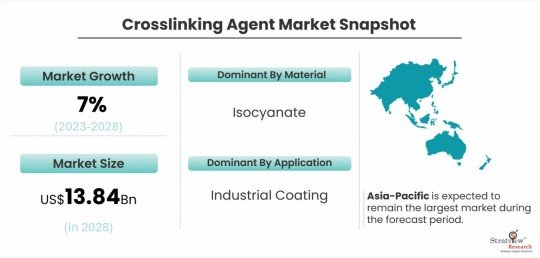Exploring the Growth Drivers in the Crosslinking Agent Market
The crosslinking agent market has been witnessing significant growth, driven by its increasing demand across various industries such as coatings, adhesives, rubber, and polymers. Crosslinking agents enhance the performance of materials by forming bonds between polymer chains, improving durability, chemical resistance, and thermal stability. This article will explore the key growth drivers propelling the crosslinking agent market.
According to Stratview Research, the crosslinking agent market was estimated at USD 9.2 billion in 2022 and is likely to grow at a CAGR of 7% during 2023-2028 to reach USD 13.84 billion in 2028.

1. Rising Demand in the Coatings Industry
One of the primary factors driving the growth of the crosslinking agent market is the increasing demand from the coatings industry. Crosslinking agents play a critical role in improving the performance of coatings, particularly in applications that require enhanced resistance to environmental factors such as heat, UV radiation, chemicals, and abrasion. The automotive, aerospace, and construction industries are some of the largest consumers of coatings, and their growth directly impacts the demand for crosslinking agents.
As industries focus on developing high-performance and protective coatings, the need for crosslinking agents continues to rise. Moreover, the shift toward water-based coatings that are environmentally friendly is creating new opportunities for the market as regulations tighten on volatile organic compound (VOC) emissions.
2. Expansion of the Adhesives and Sealants Sector
The adhesives and sealants industry is another significant driver of the crosslinking agent market. Crosslinking agents enhance the bonding strength, flexibility, and durability of adhesives, making them suitable for a wide range of applications, from automotive and construction to electronics and packaging. With the growing adoption of advanced materials in industries like electric vehicles (EVs) and consumer electronics, the demand for high-performance adhesives is on the rise, subsequently driving the market for crosslinking agents.
3. Growth in Polymer Applications
Crosslinking agents are essential in improving the structural integrity and performance of polymers. The polymer industry, which supplies products for sectors such as packaging, healthcare, and textiles, has experienced substantial growth due to the demand for lightweight and durable materials. Crosslinked polymers offer enhanced strength, heat resistance, and chemical stability, making them ideal for use in harsh environments.
4. Sustainability and Eco-Friendly Solutions
As environmental concerns grow, the industry is shifting toward more sustainable, eco-friendly solutions. Manufacturers are focusing on developing low-VOC and water-based crosslinking agents to meet stringent environmental regulations. This shift presents significant growth opportunities, especially in regions with strict environmental standards like Europe and North America.
Conclusion
The crosslinking agent market is poised for steady growth, driven by expanding demand across various industries, particularly in coatings, adhesives, and polymers. The push for sustainability and the increasing focus on high-performance materials will continue to create opportunities for innovation and expansion in this market.